Earlier today, students at the encampment were ordered by the University to vacate the Kambri grounds of the encampment. In a media release sent to Woroni early this morning, the ANU explained that the University, “directed the small number of remaining participants in the encampment in the University’s Kambri precinct to immediately vacate the site as it poses an unacceptable safety risk.”
They continue, that their orders are “reasonable and non-negotiable direction, on the basis of safety and wellbeing for the ANU community, to immediately remove their belongings and vacate the site,” detailing that, “Failure to comply with this direction, issued to ensure safety and wellbeing, will result in disciplinary action.”
This statement comes directly following UniSafe action at the encampment this morning. At approximately 8:30am, members of the encampment were informed by UniSafe, including head of security Lucas Owen, that they were required to immediately vacate the premises.
However, this order from the ANU comes in the context of the University not publicly addressing the demands of the encampment, after almost a month into the student protest. Last week, the encampment at the University of Melbourne vacated the occupied grounds, and their occupation of the Arts West building, renamed by student protestors to “Mahmoud’s hall”, following the University’s promise to disclose all military ties, which was one of the primary demands of the encampment.
Following these orders, students, staff, and members of the broader community arrived at Kambri and formed a human barricade around the encampment. By 9:30am, it is estimated more than 100 people gathered around Kambri lawn.
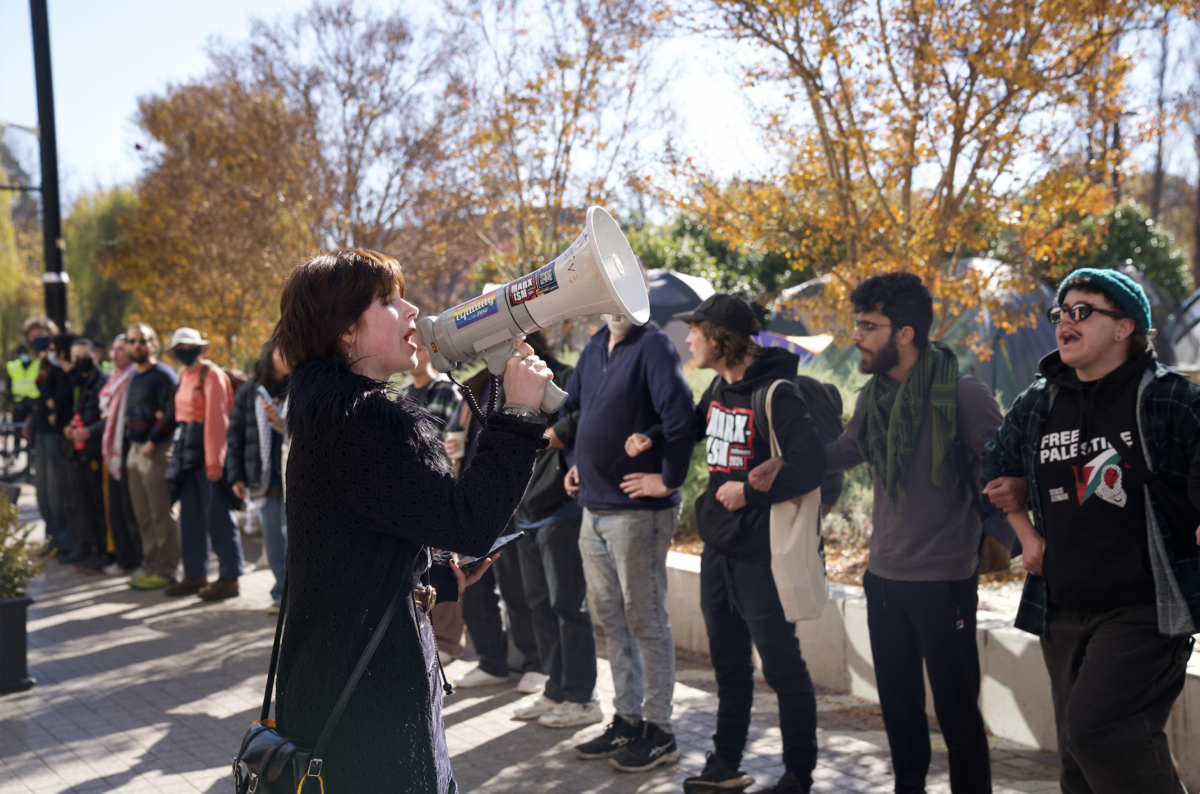
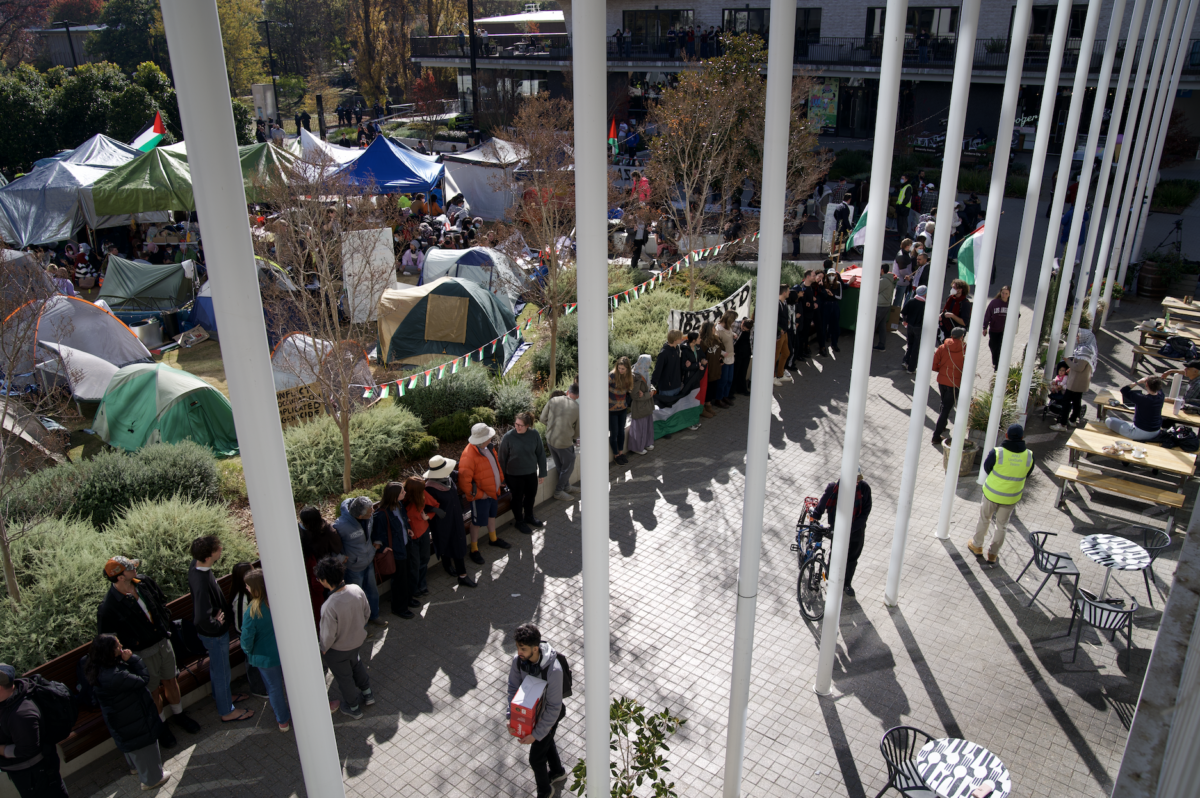
Protesters were met with approximately 20 UniSafe staff stationed around the perimeter of Kambri Lawn, and approximately 10 police officers patrolling the area around University Avenue up to the bridge to Chifley Library.
The University explained that, “The encampment is currently occupying the primary emergency evacuation site for the large number of people living in, visiting and using Kambri and the surrounding area,” elaborating, “during a fire alarm and related evacuation of the residential hall and the cultural centre in Kambri, the alternate assembly area failed. This failure and unacceptable risk to health and safety was immediately reported by relevant University authorities and an investigation identified an intolerable risk to students, staff and wider public.”
In the letter given to members of the encampment this morning, the University cited an incident on the 21st May at 12:50pm which “revealed a serious safety concern” to the point that the encampment now “poses an unacceptable risk to the safety and security of our staff and students.” No elaboration was given on the incident or the issues revealed with the backup evacuation site.
They added, “Kambri is a central, busy and frequently visited area of campus with a significant volume of foot traffic. This includes a student residence for 400 students, major teaching and study areas, a medical centre, a gym and swimming pool, a cultural centre accommodating 1,000 visitors, and businesses open to the public.”
However, it should be noted that the Kambri lawns, where the encampment is located, is 476 square metres big and has a capacity of 450 people. Fenner Hall has approximately 452 students.
The University maintains that these concerns have been “the case since the encampment commenced, we have not directed any of our students to stop protesting. They may continue to do so as long as it is respectful, peaceful and abides by our Codes of Conduct.”
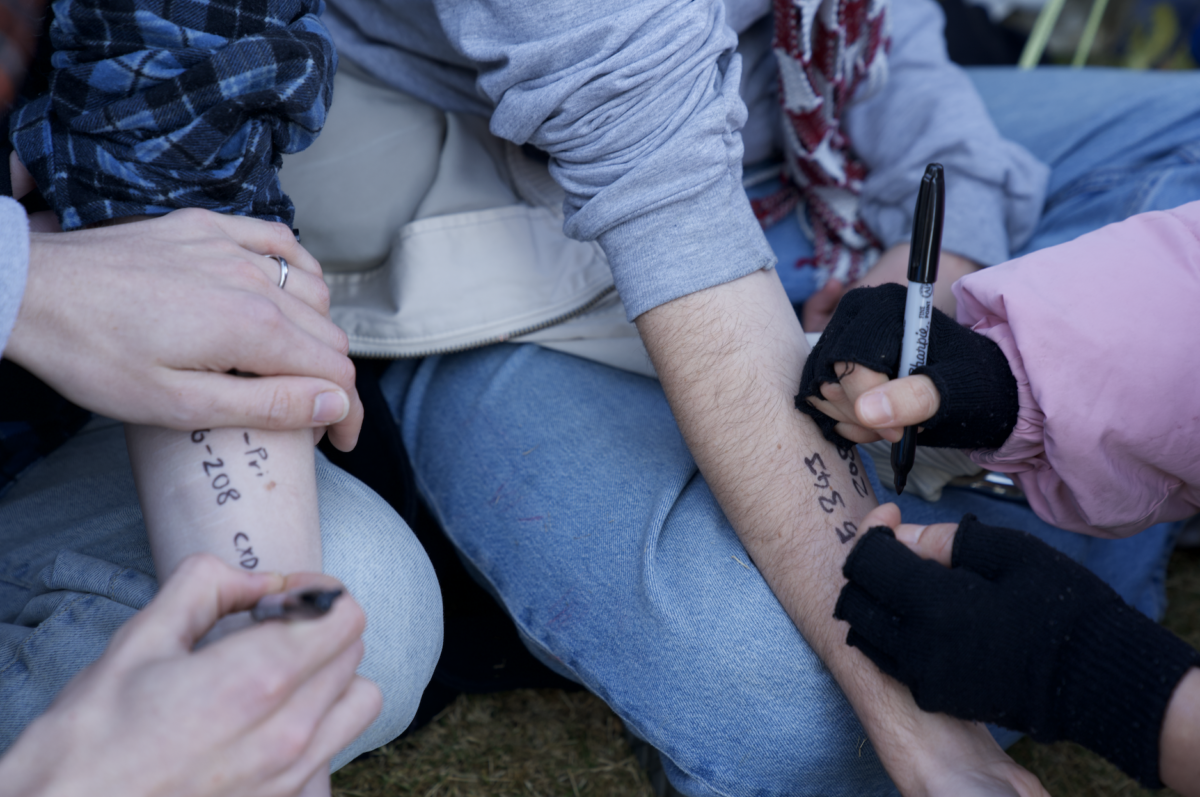
Last week, the University ordered seven students to vacate the camp for “for the purposes of health and safety and good order of the campus,” with the Deputy Vice Chancellor’s emailing detailed that she, “received reports regarding the negative impacts of the encampment on the wellbeing and safety of the broader University community.”
At approximately 11:00am, students at the encampment believed that the ACT Police were issuing a formal Move On Order to members of the encampment. The AFP have Move On powers under the Crimes Prevention Act 1998, which allows them to issue an order on people they believe have or are likely to engage in violent, disorderly or intimidating conduct in a public place. An Order on the encampment would require protestors to leave Kambri, with failure to comply leading to potential arrest.
Despite heavy UniSafe and police pressure, at approximately 12:00pm students voted overwhelmingly to stay at the encampment.
As of the time of publishing, no official Move On Order has been presented to the encampment. Nonetheless, protesters continued to reiterate their rights to one another over the megaphone, particularly discussing their rights should they be arrested. Multiple students at the encampment wrote the phone numbers of lawyers on their arms.
At 2:03pm, a small speaker placed near Symposium and surrounded by members of the AFP addressed members of the encampment. The pre-recorded voice message said, “The ANU Gaza Solidarity encampment, this notice is to inform you that you are directed to vacate this area by 12PM tomorrow, Tuesday, the 28th of May, 2024. Your current position is situated within the primary evacuation zone for the Kambri precinct. If you wish to continue, you are to relocate to the grass area beyond North Road in front of the engineering building. Non-compliance with this direction by 12PM tomorrow may result in further action by ACT police.” The message was played three times, with each time students shouting “shame” in response.
An ANU spokesperson told Woroni, “ANU is working with ACT Policing to ensure the safe removal of people from the current encampment,” detailing that, The University expects encampment participants to follow directions from police. Police directions are enforceable under law.”
They maintain, “the University’s initial direction to the encampment is about safety for our entire community. No one has been told not to protest. Today’s direction is about the safety of the campus in the event of an emergency. The University has proposed alternative sites for protest.”
However, students at the encampment have noted that the area of relocation prescribed by the University has a risk of flooding in poor weather conditions.
Following this announcement, speakers from the encampment continued to urge people to stay around this afternoon and to reconvene tomorrow for a rally at 10:30am ahead of the 12pm deadline. Members of the encampment have expressed deep gratitude for the show of community support today both from students and the wider public.
While universities such the University of Melbourne through a leaked video, have threatened police action, no university in Australia has yet to call the police to remove students from encampments.
One protester, Pip, considers “it such a victory for us to have the police leave us alone for today… to show that our numbers and community support” continues to defend the encampment despite such short notice.
ANUSA President Phoenix O’Neill told Woroni that ANUSA completely opposes the “use of force to move the encampment on by police or security.” They consider the “police presence at a peaceful protest, and on campus” an “uncalled for escalation” of the situation which is both “unnecessary and harmful to students” impeding on their freedom of speech and right to protest. ANUSA continues to urge the ANU to engage with the encampments “reasonable and ethical demands” in a productive manner. They call “for a peaceful resolution and to avoid harm to students and other members of the ANU community”
Despite the University reiterating its support of students’ rights to protest, members of the encampment have shared concerns that this move by the University is an infringement on their right to protest.
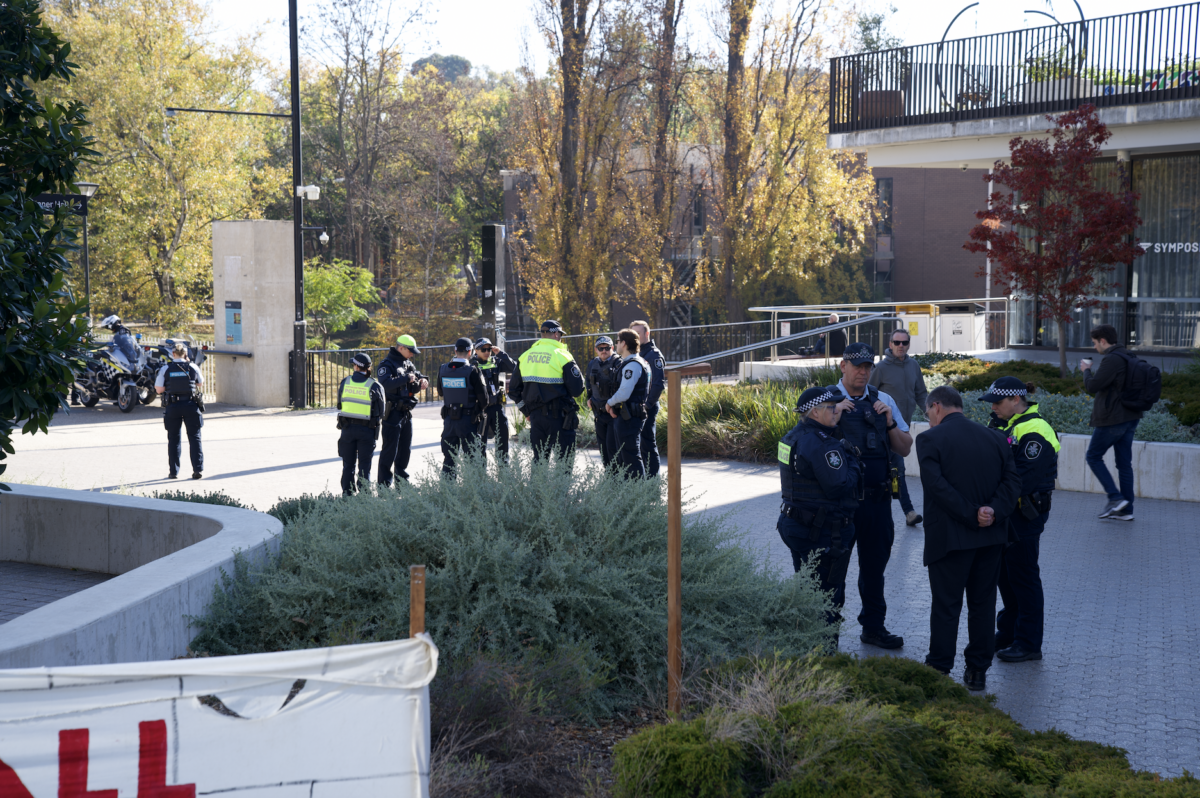
Students at the encampment have also deplored the University for making this move on National Reconciliation Day.
According to Reconciliation Australia, the National Reconciliation week, starting today, commemorates two important days which relate to land rights of First Nations people. These include the successful 1967 referendum and the High Court Mabo decision. In the 1967 successful referendum, almost 90 percent of Australians voted “yes” to include Aboriginal and Torres Strait Islander people in the census and allowed the Australian Government to make “special laws” for Aboriginal and Torres Strait islander people. The High Court Mabo Decision commemorates Eddie Koiki Mabo, a Mer Island man, whose court case successfully overturned the legal fiction of “terra nullius”, or “land belonging to no-one.”
Encampments continue nationwide, with University of Sydney’s encampment the first to set up in Australia and on their 35th day of encampment. ANU’s encampment enters its 29th day, with today marking a month of the encampment.
As of publication of this article, Woroni understands that the University has not pursued any disciplinary action against students who refused to move from the encampment today.
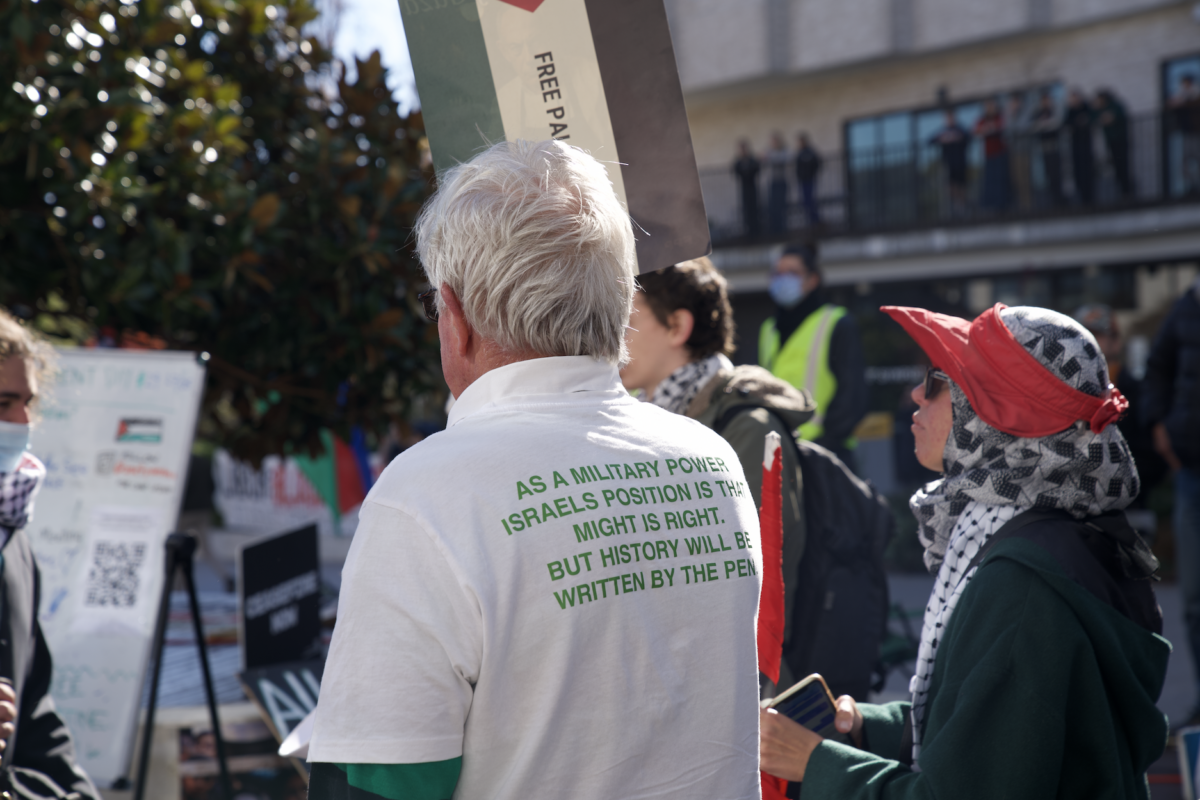
Woroni’s coverage of the protest and counter-protests will continue in the coming weeks.
……
As always, please access support if these events or their coverage are distressing to you.
ANU Student Safety and Wellbeing Team
This article was written by members of the Woroni Board of Editors. It does not accurately reflect any one person’s opinion or views. Please direct message Woroni, or email woronieic@gmail.com, if you have any questions, concerns or corrections. Please also reach out if you would like a photo of you removed from our social media accounts.
We acknowledge the Ngunnawal and Ngambri people, who are the Traditional Custodians of the land on which Woroni, Woroni Radio and Woroni TV are created, edited, published, printed and distributed. We pay our respects to Elders past and present. We acknowledge that the name Woroni was taken from the Wadi Wadi Nation without permission, and we are striving to do better for future reconciliation.
